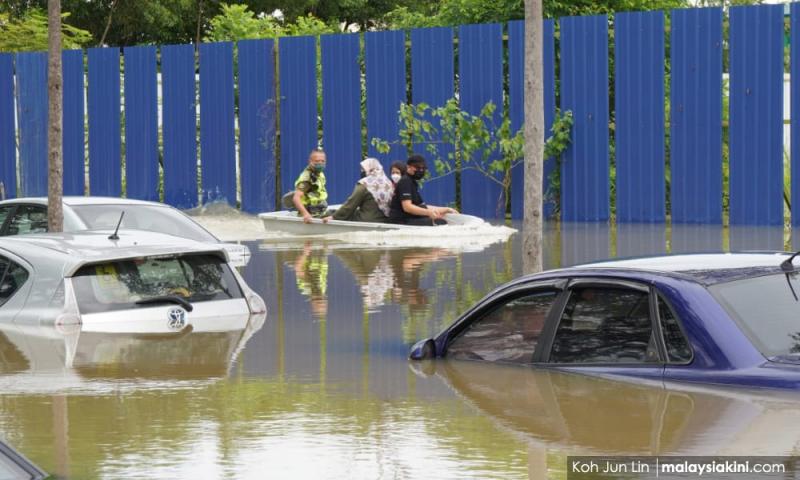The views expressed here are those of the author/contributor and do not necessarily represent the views of Malaysiakini.
LETTER | Dealing with motor insurance and floods
LETTER | In Malaysia, all motor vehicles on the road must at least be insured with legal liability for death or bodily injury to third-parties as required under the Road Transport Act 1987.
This basic coverage is not as popular as the premium is only slightly lower than Third-Party cover, which includes loss or damage to third-party property.
Without Third-Party cover, many drivers would not be able to pay for repairs after causing extensive damage to another vehicle.
Therefore, older vehicles are insured under Third-Party cover if owners do not wish to pay higher premium for comprehensive insurance that also covers for damage and loss of own vehicle due to accidental fire, theft, or an accident.
However, the standard comprehensive insurance policy merely provides basic cover and does not include damage caused by flood, windstorm, landslide, and other natural disasters; or from malicious damage resulting from strike, riot, and civil commotion.
Premiums for additional coverage used to be high, at half percent of sum insured for flood cover or RM500 per annum for insuring RM100,000.
Many insurers have reduced the rate to only RM200 a year for RM100,000, or RM100 for RM50,000, which are relatively affordable.
While it is prudent to include flood cover for comprehensive insurance, it is better to prevent vehicles from being flooded.
Even if full compensation is eventually paid out by the insurer, the driver is rendered immobile until a replacement vehicle is made available for use.
As such, it will be foolhardy to attempt driving over a flooded road with fast-moving water flowing from one side to another, as some stretches may have been washed away and could be too deep for cars to pass through.
As for roadside parking, one must be wary of flash floods caused by blocked drains in heavy downpour. Many drivers were shocked to see their cars half-submerged in water after emerging from the comfort of a building they sought shelter in.
Whenever there was an option to park on the upper floors or the basement of a same building, I would choose the former over the latter. This is because rainwater flows into the bottom of a building and the basement would be flooded if water is not pumped out in time.
Likewise, it is the same for many underpasses that rely on pumps to ensure the stretches below ground are not flooded, such as those along Jalan Tun Razak at the junction with Jalan Bukit Bintang in Kuala Lumpur; and at Jalan Chan Sow Lin just below the LRT steel bridge.
Over the past decades, there were many times I had to drive past flooded roads, but always successfully. I would first brace myself, switch off the air-conditioning, shift to the lowest gear and drive the car slowly but steadily without moving the accelerator pedal.
Once past the flooded stretch, I would gently step on the brake pedal several times to dry the brake pads or brake linings and continue the journey at a slower speed. Thanks to weatherstrips at all four doors, my cars were waterproof with the interior remaining dry.
But one must be extra cautious in thunderstorms. Just before it rains, the strong winds could bring down branches or entire trees crashing onto the road or passing vehicles. Owners involved in such accidents cannot claim from insurance if not covered for natural disasters.
In any case, insurance does not offer any protection, only compensation. The best protection comes from being smart and playing safe. Insurance premiums are similar to buying lotteries - the chances of getting compensation or winning are slim.
But should anyone receive an insurance proposal that offers a large compensation for ultra-low premiums, it is either a scam or the insurer would collapse in no time as the company would run out of money to pay claims.
The premiums collected by insurance companies must be more than enough to pay out claims and cover overheads plus some profits left to justify doing the business.
For premiums to be affordable, covers are limited, and those insured must comply with many terms and conditions.
Such understandings are necessary in order to deal successfully with motor insurance matters as many vehicle owners and drivers are ignorant at their own peril, and also about floods which are increasingly common with climate change.
RM12.50 / month
- Unlimited access to award-winning journalism
- Comment and share your opinions on all our articles
- Gift interesting stories to your friends
- Tax deductable
